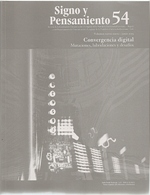Abstract
What follows is a partial report of a research project on community and citizen communication processes and the latter’s contribution to bring peace and social transformation in the Colombian Magdalena Medio region. It was carried out by an interdisciplinary group of lecturers from four different universities (two Colombian: Universidad Javeriana and Universidad del Norte, and two American: University of Oklahoma and British Columbia), working together with a regional network of community radio stations. The research offered the possibility of examining both qualitative and participatory tools which in turn helped us ponder the relevant and central role played by a communication technology such as community radio run by civil society struggling for peace.
Riaño Alcalá, P. (s. f.), Recuperar las memorias y elaborar los duelos [inédito].
Riaño Alcalá, P. (2000), “Recuerdos metodológicos: el taller y la investigación etnográfica”, en: Revista de Estudios Sociales, núm. 7, Universidad de los Andes.
Riaño Alcalá, P. (2004a), Encuentros artísticos con el dolor, las memorias y las violencias: la reconciliación y los procesos de paz a nivel local [documento 29], Vancouver, UBC.
Riaño Alcalá, P. (2004b), Migraciones forzadas y crisis de la memoria: los talleres de memoria con población desplazada en Colombia [documento 17], Vancouver, UBC.
Rincón, O. (2006), Narrativas mediáticas, Bogotá, Gedisa.
Tacchi, J.; Slater, D., y Lewis, P. (2003), Evaluating Community Based Media Initiatives: an Ethnographic Action Research Approach [en línea], disponible en http://www.ourmedia. com, recuperado: mayo de 2003.
This journal is registered under a Creative Commons Attribution 4.0 International Public License. Thus, this work may be reproduced, distributed, and publicly shared in digital format, as long as the names of the authors and Pontificia Universidad Javeriana are acknowledged. Others are allowed to quote, adapt, transform, auto-archive, republish, and create based on this material, for any purpose (even commercial ones), provided the authorship is duly acknowledged, a link to the original work is provided, and it is specified if changes have been made. Pontificia Universidad Javeriana does not hold the rights of published works and the authors are solely responsible for the contents of their works; they keep the moral, intellectual, privacy, and publicity rights.
Approving the intervention of the work (review, copy-editing, translation, layout) and the following outreach, are granted through an use license and not through an assignment of rights. This means the journal and Pontificia Universidad Javeriana cannot be held responsible for any ethical malpractice by the authors. As a consequence of the protection granted by the use license, the journal is not required to publish recantations or modify information already published, unless the errata stems from the editorial management process. Publishing contents in this journal does not generate royalties for contributors.


